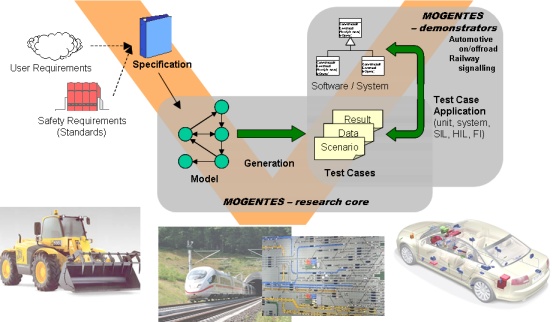Model-based Generation of Tests for Dependable Embedded Systems (MOGENTES)

EU FP7 ICT CP 216679
Duration of the project:
January 1, 2008 - December 31, 2010
Partners:
- Austrian Research Centers GmbH - ARC, Austria, coordinator,
- Budapest University of Technology and Economics, Hungary,
- Ford Forschungszentrum Aachen GmbH, Germany,
- Swiss Federal Institute of Technology Zurich, Switzerland,
- Graz University of Technology, Austria,
- Prolan Irányítástechnikai ZRT, Hungary,
- Prover Technology AB, Sweden,
- SP Technical Research Institute of Sweden, Sweden,
- Thales Rail Signalling Solutions GmbH, Austria,
- Re:Lab S.R.L. Italy
Project aim:
MOGENTES aims at significantly enhancing testing and verification of dependable embedded systems by means of automated generation of test cases relying on development of new approaches as well as innovative integration of state-of-the-art techniques. Driven by the needs of its industrial partners, it will address both testing of non-functional issues like reliability, e.g. by system stress and overload tests, and functional safety tests, meeting the requirements of standards such as IEC 61508, ISO WD 26262, or AUTOSAR. MOGENTES will demonstrate that different domains with a wide variety of requirements can significantly benefit from a common model-based approach for achieving automated generation of efficient test cases and for verifying system safety correctness using formal methods and fault injection, as this approach increases system development productivity while achieving predictable system dependability properties. For that purpose, proof-of-concept demonstrations will show the applicability of the developed technologies in two application domains: railway and automotive.
In particular, MOGENTES aims at the application of these technologies in large industrial systems, simultaneously enabling application domain experts (with rather little knowledge and experience in usage of formal methods) to use them with minimal learning effort. All in all, MOGENTES will increase knowledge and develop new techniques and tools in the area of verification and validation of dependable embedded systems which can be applied in model-based development processes also by non-experts in formal methods.

Further information: István Majzik, associate professor


